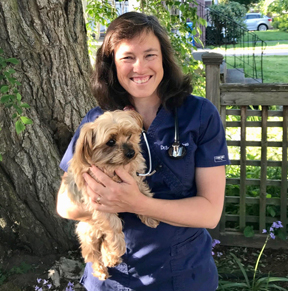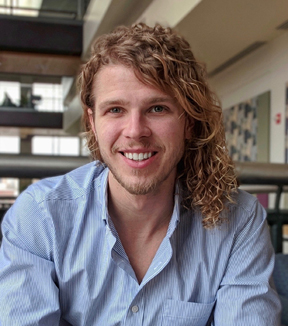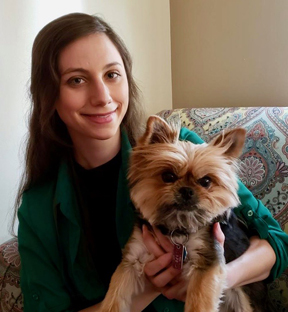
Davidow drone bug

In this year’s Solutions for the Profession essay contest for veterinary students, organized by the VIN Foundation, 80 entrants took many approaches to address the theme of consolidation in the profession. First-place winner Joanne Yi, whom we met last week, eloquently told the story of her mom’s business and its parallels to changes in the veterinary industry.
Today, we meet the second- and third-place winners, Dr. Joe Marchell and Annie Showers. Joe used humor and deep personal knowledge of the profession to write his essay, while Annie took a detailed research approach to the topic.
"What an exciting time for the veterinary field! Never has our quaint, but oh-so-romantic profession received so much flattery from suitors."
That's Joe's opening line. In his essay, Joe uses a lighthearted touch to explore heavy material — the forces driving consolidation and the potential effects on new veterinarians. He also references possible disruptive effects of technologies such as apps and drones.
Joe graduated in May from Washington State University (WSU). He learned about the essay contest through an email from the Veterinary Information Network (an online professional community that gave rise to the VIN Foundation). Joe was scheduled for graveyard shifts during a rotation on the large animal intensive care unit, and found himself with time in the middle of the night to think about the topic and write.

Photo by Mike Ford
Dr. Beth Davidow, shown with her dog, Biscuit, was one of 10 judges in the essay competition.
When I read his essay, I was quite impressed at his knowledge of the industry, economics and finance. Here is part of his summary on the rise in practice sales prices:
"In September 2017, Mars Inc. purchased VCA for $9.1 billion, an estimated 18 times EBIDTA [earnings before interest, depreciation, taxes and amortization]. It's almost ironic that the more hospitals you buy at once, the more you’ll pay for each one.
"Historically, hospitals fetched three times to six times EBIDTA. Once the cat had been let out of the bag, many small consolidators began to build regional groups, hoping to flip them to national entities for a quick return on investment. Well, this sent individual practice prices through the roof, and just in time for baby-boomer owners looking to make a clean exit to retirement."
And he ponders potentially worrisome corporate strategies:
"If I were sitting in the board room of one of these groups — and thank God I’m not — I would be lobbying for new veterinary colleges left and right. An increase along the supply curve of veterinarians would drive wages down. Voilà, a workforce of highly skilled workers with loans coming due, desperate for work."
Joe’s firm grasp on the issues facing our profession comes from his family and from an active school business club. Joe is the son of two veterinarians, each of whom owns a practice. Thus, Joe observed not one business but two while growing up.
At WSU, Joe was involved with the Veterinary Business Management Association. He was president last year of the campus chapter, which hosted events almost every week. It brought in speakers on a large variety of finance and business topics, including online marketing, practice management, retirement savings, practice operations and emotional intelligence.
Joe Marcell 288

Photo by Dr. Bethany Richards
Dr. Joe Marchell grew up in the profession as the son of veterinarians. He just graduated and is now in practice.
I asked Joe what he thinks needs to change so that veterinarians stay relevant in the future. "Since I am just finishing veterinary school, I’ll focus there," Joe answered. "I believe the priorities need to shift in the veterinary educational system. In the future, we will face a world where computers using AI [artificial intelligence] will be able to make many diagnoses. However, computers will never be able to provide the emotional support that clients will need to make good decisions. To survive in a changing profession, veterinarians will need emotional intelligence and outstanding communications skills, not just book knowledge."
Joe told me that he worries that universities still tend toward an authoritative style in teaching and medicine, even as our world and our clients look for a more collaborative approach to care. He believes we need to shift our discussion from "these clients are difficult to work with" to "I don’t know how to work with these clients to best care for their pet."
As for consolidation, Joe sees it as an inevitable part of our changing future. The increasing number of independent practice owners in their 60s looking to retire and sell at the same time that many younger veterinarians bear heavy student debt and want more work-life balance creates a gap for others with money to step in. At the same time, Joe believes technology could influence the trend and change the way practice looks in the future. He writes:
"Welcome to the 21st century. Things become obsolete the moment they hit the shelf. Large consolidators have placed a lot of eggs — Fabergés no less — in their baskets. It’s all Champagne and spa days until the guy who invents the carton shows up. Worse, he's got an app that lets you buy direct from local farms — delivered by drones in four hours, of course."
Joe ends: "Nothing is guaranteed tomorrow, but one thing is for certain: The times they are a-changin'. Let’s try to enjoy the ride; I know I will."
In our conversation, Joe clarified that he believes veterinarians should not be passive riders into the future but actively help to determine what change looks like.
Joe's own immediate future is with a veterinary startup in Maine, Rarebreed Veterinary Partners.
Finding answers on her own
Annie Showers, a rising third-year student at Ohio State University, had heard a lot of buzz around the issue of consolidation about the time she received a VIN email about the contest. To learn more about the topic, rather than just read articles written by others, she decided to gather firsthand information.
As she explained in her essay: "We need to know what the benefits are, and what we are losing with relatively aggressive corporatization. To find the answer, I wanted more than the opinion of a single columnist in a veterinary news outlet. So I designed a survey that was sent to veterinarians primarily in Ohio."
Annie Showers 288

Photo by Emily Showers
Annie Showers, pictured with her dog, Chloe, surveyed veterinarians primarily in Ohio about their views of and experiences with practice consolidation.
She expected only a few responses but received more than 300! That gave her a lot of material to work with and consider.
Of the veterinarians who responded, 171 were practice owners or co-owners, 33% of whom had considered selling their practice to a larger group.
Asked why they considered selling or sold their practice, respondents put financial considerations at the top of the list, and many said they were ready to retire. Several mentioned difficulties in finding an independent veterinarian willing to buy and run the practice. Among those who turned down an offer, many were not yet at retirement age and liked the control over their work environment.
Annie asked the full group (owners and non-owners) about benefits and potential downsides of corporate ownership. Benefits they named included lower inventory prices (79%) and better pay and benefits for employees (73%). On the downside, 83% worried about the continued ability of veterinarians to make medical decisions, and 84% worried about pushing profit at the expense of quality medical care.
Asked their opinions about the impact of consolidation on quality of care, more than half of respondents said they believe that consolidation negatively impacts quality. One-third said consolidation has no impact on quality. Only 10% indicated that consolidation enhances the quality of veterinary care.
Annie also gave survey-takers room to make additional comments. She received more than eight pages of answers, which told her that many veterinarians consider the issue important. They elaborated on benefits and disadvantages. The perspectives varied. Some pointed out consolidators are not all the same. Respondents described a variety of experiences after a sale. Many veterinarians urged that our community attempt to learn from the impact of consolidation on other industries, including dentistry, human health care, pharmacy and optometry.
Annie’s bottom line:
"Until every private practice can find a way to consistently provide solid retirement prospects for those heading out and reasonable starting salaries for those coming in, corporations will continue to buy up smaller outfits. Do we run and hide? Scream and curse the capitalist giant? No. ... As veterinarians, we do not wait for the ideal situation that allows us to practice the best medicine possible; we practice the best medicine possible in whatever situation we are in."
Next: Lizards, nonprofit experience and the situation Down Under
About the author: Beth Davidow, DVM, DACVECC, has been a VIN emergency medicine consultant since 2003 and is also a member of the VIN Board of Directors. She co-owned two 24/7 multi-specialty hospitals in Seattle, and was the first director of patient quality for BluePearl. Davidow currently is vice president of the American College of Veterinary Emergency and Critical Care, and lectures and consults on veterinary critical care, patient safety and ownership issues. She writes the blog The Veterinary Idealist.